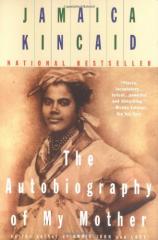Reading Group Guide
Discussion Questions
The Autobiography of My Mother

1. The novel opens with a profound statement, setting the overtone of the story: "My mother died at the moment I was born, and so for my whole life there was nothing standing between myself and eternity; at my back was always a bleak, black wind." How do you interpret this? What does this say about Xuela to you?
2. At one point, Kincaid writes, "And so my mother and father then were a mystery to me; one through death, the other through the maze of living; one I had never seen, one I saw constantly." What is the nature of Xuela's relationship with her father? Do you think he is a good man? Why do you think he saw the importance of sending Xuela to school when it was not common for women to attend?
3. Xuela aborts the child she is carrying, leaving her barren. She chooses not to be a mother herself, and avoids forming close relationships. She says, "I felt I did not want to belong to anyone, that since the one person I would have consented to own me had never lived to do so, I did not want to belong to anyone; I did not want anyone to belong to me." Does she fear abandonment from those she could be close to, as well as for children of her own, had she chosen to bear them? How would you explain her decision?
4. Xuela is born of mixed race; she is part Carib Indian, a dying and defeated culture on the island, and part Scottish and African. The island itself has been colonized by England, and the natives have become oppressed by their rule. Xuela accepts her heritage... "I refused to belong to a race, I refused to accept a nation. I wanted only, and still do want, to observe the people who do so"... yet remains fiercely independent.What do you make of Kincaid's portrayal of race in the novel? What role do politics play? Do you think Kincaid is making a statement about the wealthy and the powerful versus the poor and the weak? The English monarchy?
5. The central focus throughout the novel is Xuela's incapability of loving. She loved one man but ended the relationship before he could. "I looked out toward the horizon, which I could not see but knew was there all the same, and this was also true of the end of my love for Roland." Why does she allow herself to love Roland? How is he different?
6. Eventually Xuela marries an English doctor, Philip Bailey. How did she come to choose him? Was it merely a coincidence she married someone of higher social standing than herself? Do you think she contributed to the death of Philip's first wife?
7. Xuela has a series of unsuccessful relationships with other women. Left with her father's laundress, Ma Eunice, until she was seven, she experienced a loveless life of solitude. Her stepmother jealously tormented her until she left to live with friends of her father's. Perhaps her only friendship, with Madame LaBatte, ended shortly. Her half-sister despised her as the result of her mother's influence and Philip's demanding first wife treated Xuela as an inferior. Yet, despite the lonely life she led, Xuela felt it unnecessary to form relationships. Do you think these women were intimidated by Xuela's independence? How did Xuela regard her half-sister? Why did Xuela abandon the only friendship she had, with Madame LaBatte?
8. Xuela selfishly takes extreme pleasure from her intense sexual encounters. What do you think is the driving force behind this attraction? Is her sexuality liberating? A form of power and control?
9. How would you characterize Xuela? Do you find her likable? Do you think she takes any enjoyment out of life? "Everything in my life, good or bad, to which I am inextricably bound is a source of pain." Is she to blame for this?
10. As time passes, Xuela finds herself alone, everyone known to her deceased. There is nothing left for her except death, the only inevitable certainty. She admits,"The fact of my mother dying at the moment I was born became a central motif of my life." Looking back on how she lived her life, does she say this with regret? What would she change, if she could? Do you feel sorry for her?
The Autobiography of My Mother
- Publication Date: January 1, 1997
- Paperback: 240 pages
- Publisher: Plume
- ISBN-10: 0452274664
- ISBN-13: 9780452274662







